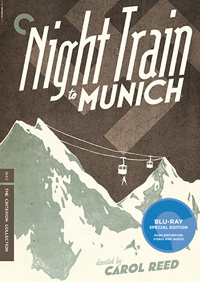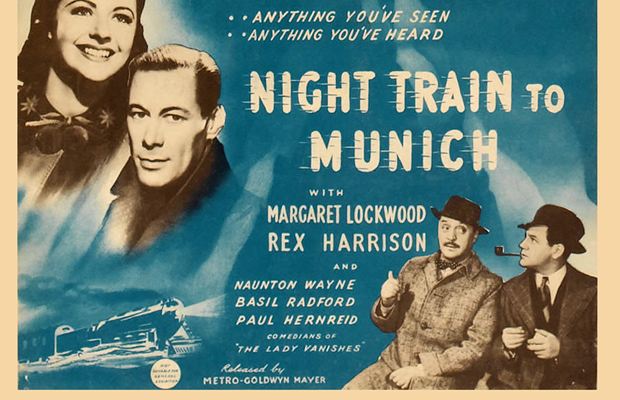
In many ways, Night Train to Munich also plays like the poker faced cousin of WWII comedy favorite Ernst Lubitsch’s To Be or Not To Be (1942), in which a Shakespearean acting troupe becomes embroiled in a resistance plot in Nazi occupied Poland. Reed’s scenario is oh-so-serious, opening on a montage of Hitler’s fists banging over countries on a map prior to infiltration, while a rather underutilized James Harcourt’s scientist Axel Bomasch makes an anxiety ridden getaway on an airplane runway. Next, the wide eyed and perilously sincere Margaret Lockwood gets thrown into a concentration camp (!) where she takes pity on a beaten rebel played by a noble Paul Henreid (credited here with his actual name, Paul Hernreid), who helps her escape to her father in England before its revealed he’s Gestapo and using the young woman as a ruse to kidnap her father back to Berlin. But in England, the plot picks up with a cocky and indefatigably vibrant Rex Harrison as Dickie Randall, a British undercover intelligence agent, who is often so bemused one expects Reed to plunge half-cocked into slapstick at every twist and turn in the narrative—but a palpable grimness abounds, even with the appearance of Charters and Caldicott (Basil Radford, Naunton Wayne), a pair of British subjects who get wrapped up in Harrison’s plot through principle (and an annoying degree of perseverant nosiness). Following The Lady Vanishes, writers Gilliat and Launder would resurrect these two as comic foils twice more, in John Baxter’s Crook’s Tour (1941) and in a film the writers would co-direct, Millions Like Us (1943).
The grand finale involves a rousing and anxiety laden bit with a cable car trundling its escapees across the Swiss border, predating something similarly conducted by Bruce Malmuth in the 1981 Sylvester Stallone film, Nighthawks. Harrison proves to be the film’s greatest asset with his performance as Dickie Randall, and Reed dishes some subversive bits of propaganda (the best being several references to Hitler’s Mein Kampf, which stands proudly aside Margaret Mitchell’s Gone With the Wind in the train station book store).
Disc Review:
Criterion revisits this Carol Reed title (initially released in the collection in 2010) with a newly restored high-definition transfer in 1.33:1 aspect ratio and uncompressed monaural soundtrack. The title was the last film of DP Otto Kanturek (who worked with Lang on his space adventure Woman in the Moon, 1929), and the film is framed mostly in exteriors, which helps enhance the final showdown. Despite the new transfer, Criterion doesn’t bolster the original release’s extra features.
Bruce Babington and Peter Evans:
Criterion conducted this half hour interview in 2010 with Bruce Babington, author of Launder and Gilliat, and Peter Evans, author of Carol Reed, as they discuss the contributions of the screenwriters on Night Train to Munich, along with the particular political climate and the wartime circumstances.
Final Thoughts:
Although Margaret Lockwood is merely a stock version of the usual damsel in distress, Reed’s Night Train to Munich features a winsome Rex Harrison and should certainly interest aficionados of WWII propaganda cinema.
Film Review: ★★★½/☆☆☆☆☆
Disc Review: ★★★★/☆☆☆☆☆
